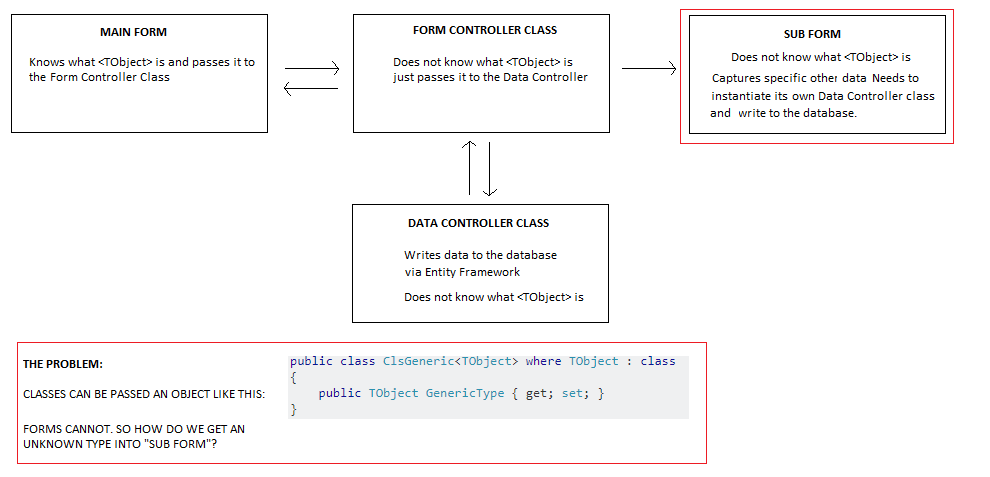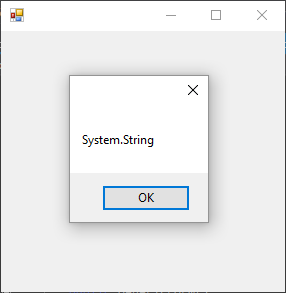Maybe you've tried this, but you can create a custom class:
public class GenericForm<TObject> : Form where TObject : class
{
// Here you can do whatever you want,
// exactly like the example code in the
// first lines of your question
public TObject GenericType { get; set; }
public GenericForm()
{
// To show that this actually works,
// I'll handle the Paint event, because
// it is executed AFTER the window is shown.
Paint += GenericForm_Paint;
}
private void GenericForm_Paint(object sender, EventArgs e)
{
// Let's print the type of TObject to see if it worked:
MessageBox.Show(typeof(TObject).ToString());
}
}
If you create an instance of it like that:
var form = new GenericForm<string>();
form.Show();
The result is:
![enter image description here]()
Going further, you can create an instance of type TObject from within the GenericForm class, using the Activator class:
GenericType = (TObject)Activator.CreateInstance(typeof(TObject));
In this example, since we know that is a string, we also know that it should throw an exception because string does not have a parameterless constructor. So, let's use the char array (char[]) constructor instead:
GenericType = (TObject)Activator.
CreateInstance(typeof(TObject), new char[] { 'T', 'e', 's', 't' });
MessageBox.Show(GenericType as string);
The result:
![enter image description here]()
Let's do the homework then. The following code should achieve what you want to do.
public class Parent
{
string Name { get; set; }
bool HasChildren { get; set; }
int Age { get; set; }
}
public class Child
{
string Name { get; set; }
int Age { get; set; }
}
public class DataController<TObject> where TObject : class
{
protected DbContext _context;
public DataController(DbContext context)
{
_context = context;
}
}
public class FormController<TObject> where TObject : class
{
private DataController<TObject> _dataController;
public FormController(Button btn, DataController<TObject> dataController)
{
_dataController = dataController;
btn.Click += new EventHandler(btnClick);
}
private void btnClick(object sender, EventArgs e)
{
GenericForm<TObject> form = new GenericForm<TObject>();
form.ShowDialog();
}
}
public class GenericForm<TObject> : Form where TObject : class
{
public TObject GenericType { get; set; }
public GenericForm()
{
Paint += GenericForm_Paint;
}
private void GenericForm_Paint(object sender, EventArgs e)
{
MessageBox.Show(typeof(TObject).ToString());
// If you want to instantiate:
GenericType = (TObject)Activator.CreateInstance(typeof(TObject));
}
}
However, looking to your current example, you have two classes, Parent and Child. If I understand correctly, those are the only possibilities to be the type of TObject.
If that is the case, then the above code will explode if someone pass a string as the type parameter (when the execution reaches Activator.CreateInstance) - with a runtime exception (because string does not have a parameterless constructor):
![enter image description here]()
To protect your code against that, we can inherit an interface in the possible classes. This will result in a compile time exception, which is preferable:
![enter image description here]()
The code is as follows.
// Maybe you should give a better name to this...
public interface IAllowedParamType { }
// Inherit all the possible classes with that
public class Parent : IAllowedParamType
{
string Name { get; set; }
bool HasChildren { get; set; }
int Age { get; set; }
}
public class Child : IAllowedParamType
{
string Name { get; set; }
int Age { get; set; }
}
// Filter the interface on the 'where'
public class DataController<TObject> where TObject : class, IAllowedParamType
{
protected DbContext _context;
public DataController(DbContext context)
{
_context = context;
}
}
public class FormController<TObject> where TObject : class, IAllowedParamType
{
private DataController<TObject> _dataController;
public FormController(Button btn, DataController<TObject> dataController)
{
_dataController = dataController;
btn.Click += new EventHandler(btnClick);
}
private void btnClick(object sender, EventArgs e)
{
GenericForm<TObject> form = new GenericForm<TObject>();
form.ShowDialog();
}
}
public class GenericForm<TObject> : Form where TObject : class, IAllowedParamType
{
public TObject GenericType { get; set; }
public GenericForm()
{
Paint += GenericForm_Paint;
}
private void GenericForm_Paint(object sender, EventArgs e)
{
MessageBox.Show(typeof(TObject).ToString());
// If you want to instantiate:
GenericType = (TObject)Activator.CreateInstance(typeof(TObject));
}
}
UPDATE
As RupertMorrish noted, you can still compile the following code:
public class MyObj : IAllowedParamType
{
public int Id { get; set; }
public MyObj(int id)
{
Id = id;
}
}
And that should still rise an exception, because you just removed the implicit parameterless constructor. Of course, if you know what you are doing, this is hard to happen, however we can forbidden this by using new() on the 'where' type filtering - while also getting rid of the Activator.CreateInstance stuff.
The entire code:
// Maybe you should give a better name to this...
public interface IAllowedParamType { }
// Inherit all the possible classes with that
public class Parent : IAllowedParamType
{
string Name { get; set; }
bool HasChildren { get; set; }
int Age { get; set; }
}
public class Child : IAllowedParamType
{
string Name { get; set; }
int Age { get; set; }
}
// Filter the interface on the 'where'
public class DataController<TObject> where TObject : new(), IAllowedParamType
{
protected DbContext _context;
public DataController(DbContext context)
{
_context = context;
}
}
public class FormController<TObject> where TObject : new(), IAllowedParamType
{
private DataController<TObject> _dataController;
public FormController(Button btn, DataController<TObject> dataController)
{
_dataController = dataController;
btn.Click += new EventHandler(btnClick);
}
private void btnClick(object sender, EventArgs e)
{
GenericForm<TObject> form = new GenericForm<TObject>();
form.ShowDialog();
}
}
public class GenericForm<TObject> : Form where TObject : new(), IAllowedParamType
{
public TObject GenericType { get; set; }
public GenericForm()
{
Paint += GenericForm_Paint;
}
private void GenericForm_Paint(object sender, EventArgs e)
{
MessageBox.Show(typeof(TObject).ToString());
// If you want to instantiate:
GenericType = new TObject();
}
}






Cls, that's very old school behaviour and not recommended. – AraxesIProviderimplementing factory methodGetObject<T>to sub-form, and call it when needed to obtain a generic class instance. This will allow to avoid having any generic-related stuff inside top-level form, and still be type-safe at the point ofGetObject's invocation. – Galaxy